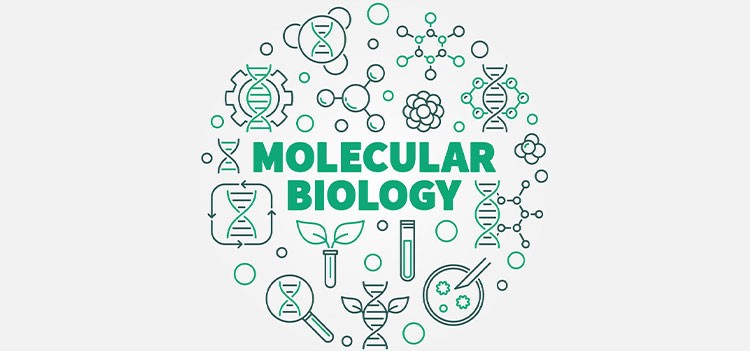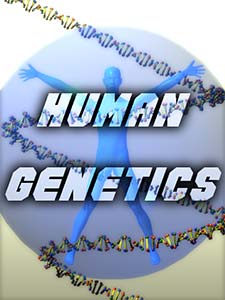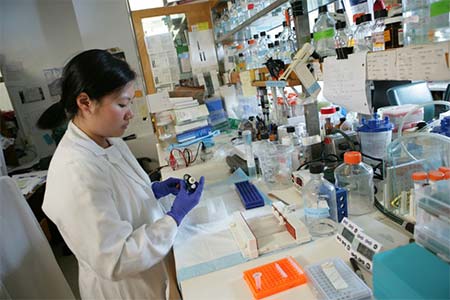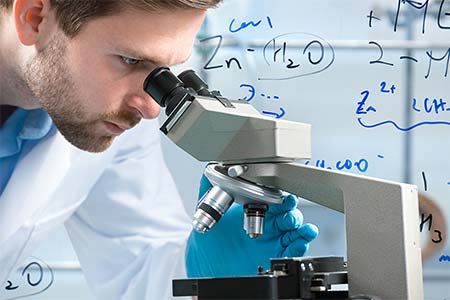Introduction to Molecular Biology and Human Genetics
Molecular biology is the study of living things at the level of the molecules which control them and make them up. While traditional biology concentrated on studying the whole living organisms and how they interact within populations. Molecular biology strives within populations by examining the components that make them complex living organisms. Molecular biology is the specialised branch of biochemistry, the study of the chemistry of molecules which are specifically connected to living processes. The molecular biology basically focuses on study of the nucleic acids (DNA and RNA) and the proteins which are constructed using the genetic instructions encoded in those molecules.
Human genetics is the study of the human genome and how genes are transmitted through generations. The human genome consists of 23 pairs of chromosomes (22 pairs of homologous chromosomes and one pair of sex chromosomes) each containing genes that code for proteins within the cell. On all homologous pairs, there are two forms of the same gene that are known as alleles, which are passed on from parent to offspring. Human genetics provides a framework for understanding the biology of the human species and is a rapidly growing field of aging research. The genetic analysis of human aging is aimed at identifying genetic variants that reflect the biological age of individuals and predict long term morbidity and other mortality and ultimately revealing the genetic determinants of aging humans.
Few lines about M.Sc Molecular Biology and Human Genetics
The M.Sc Molecular Biology and Human Genetics is a 2-years postgraduate course that is divided into 4-semesters. The course aims to underlie the theories of the fascinating science of genetics. It will provide practical experience of the major analytical techniques used in genetics and molecular biology, including gene cloning and expression, DNA sequence and bioinformatics. The course also enables the students to develop skills in scientific and crucial thinking and to study independently. It also enables the students to acquire technical skills in the workplace and integrate the knowledge gained from the theoretical aspects of the course into professional work experience.
Eligibility
The B.Sc students who have scored 50% aggregate and have studied any of the following optional subjects such as chemistry, botany, applied botany, zoology, applied zoology, environmental science, microbiology, biotechnology, genetics, applied genetics and sericulture from recognised university are eligible to apply for M.Sc Molecular Biology and Human Genetics.
Admission Procedures
The students can take admission to M.Sc Molecular Biology and Human Genetics via two modes. The first one is merit admission and the second one is direct admission.
Let’s discuss in detail
1. Merit Admission
There are many reputed colleges and universities that conduct institution-based entrance exams for admission to M.Sc Molecular Biology and Human Genetics, such mode is called Merit admissions. Every educational institution will have a few numbers of merit seats, and institution-based entrance exams are conducted to these seats. The students who qualify the entrance exams with high marks are allotted these seats and given admission under merit quota. The reason for conducting entrance exams is to filter out the serious and hardworking students from non-serious students. The fees will be usually nominal for merit seats.
2. Direct admission
The students can also take admission to M.Sc Molecular Biology and Human Genetics via direct admission. The students can directly take admission to the desired colleges through direct admission under management quota. The students under direct admissions are given special privileges where the students are not required to apply for any institution-based entrance exams for getting admissions. They can also have an option to choose their desired colleges even before the starting of the academic year. The students can contact Galaxy Educational Services for more details related to direct admissions.
Syllabus for M.Sc Molecular Biology and Human Genetics
The students of M.Sc Molecular Biology and Human Genetics will be studying the following subjects during their course duration
| Sl No | Subjects of Study |
|---|---|
|
1. |
Principles of Genetic Inheritance |
|
2. |
Statistical Tests and Genetic Analysis |
|
3. |
Basic Human Genetics and Human Cytogenetics |
|
4. |
Molecular Structure and Functions of Cell |
|
5. |
Molecular Organisation of Chromatin and Cytogenetics |
|
6. |
Cancer Biology |
|
7. |
Molecular Genetics and Genomics |
|
8. |
Human Molecular Genetics and Human Genomics |
|
9. |
Immunogenetics |
|
10. |
Biochemistry, Structure, Function and Regulation of Biomolecules |
|
11. |
Developmental and Reproductive Genetics |
|
12. |
Clinical Genetics and Genetic Counselling |
|
13. |
Population Genetics, Human Evolutionary and Behaviour Genetics |
|
14. |
Recombinant DNA Technology |
|
15. |
Molecular Diagnostic Methods |
|
16. |
Bioinformatics and Biotechniques |
|
17. |
Recombinant DNA |
|
18. |
Plant and Animal Tissue Culture |
|
19. |
Biophysics |
|
20. |
Gene Cloning and Bioethics |
Career & Scope
The M.Sc Molecular Biology and Human Genetics students can find ample job opportunities across life science sectors. They are hired in research institutes, life science organisations, they are even hired in the pharmacy sector. They usually work under research scientists in various research organisations. They can even join as lecturers in various colleges and take up teaching of the related subjects of molecular biology and human genetics.
Salary and Emoluments
The average fresh M.Sc Molecular Biology and Human Genetics students will be earning around 5 lakhs to 10 lakhs per annum. The experienced professionals will be earning around 10 lakhs to 15 lakhs per annum.
Top Recruiters for M.Sc Molecular Biology and Human Genetics
Some of the top recruiters are:
- Biocon
- Wipro Life Sciences
- Bharat Biotech
- Glaxco Smith
- Glenmark
- Cipla
- Cavin Care
- Natural Remedies
- Serum India Pvt Ltd
- Cadila
Final Lines
The demand for M.Sc Molecular Biology and Human Genetics has been increasing day by day. The industry is developing new medicines and medical treatments for various life-threatening diseases. The M.Sc Molecular Biology and Human Genetics students play a crucial role in development of these drugs. There is a lack of skilled professionals and the industry is looking forward to a large number of skilled professionals.
The students with M.Sc Molecular Biology and Human Genetics background can easily get excellent job roles that pays them handsome salaries and also provides excellent career growth. The students who are interested in practical genetics can join the M.Sc Molecular Biology and Human Genetics course.





